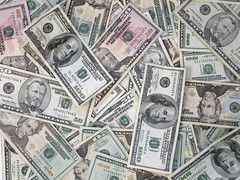From lcapelle
| 3891185981 | Industrial Revolution | the time period when power-driven machinery was developed |  | 0 |
| 3891185982 | enclosure movement | the combining of many small farms by wealthy land owners in Britain; inspired by demand for sheep's wool for textile factories |  | 1 |
| 3891185983 | factors of production | the essential elements that a nation needs for economic success: land, labor, capital, and entrepeneurship |  | 2 |
| 3891185984 | cottage industry | a craft occupation performed at home |  | 3 |
| 3891185985 | factory | a building that housed machine-driven industry |  | 4 |
| 3891185986 | industrialization | the process of changing to power-driven machinery |  | 5 |
| 3891185987 | Jethro Tull | gentleman farmer who invented the seed drill for planting grain |  | 6 |
| 3891185988 | Richard Arkwright | inventor of the spinning frame, which spun stronger, thinner thread |  | 7 |
| 3891185989 | James Watt | British inventor who made steam engines faster and more efficient |  | 8 |
| 3891185990 | Robert Fulton | developed and operated the steamship "Clermont" on the Hudson River |  | 9 |
| 3891185991 | labor union | organizations representing workers' interests |  | 10 |
| 3891185992 | strike | work stoppages |  | 11 |
| 3891185993 | mass production | the system of manufacturing large numbers of identical items |  | 12 |
| 3891185994 | interchangeable parts | identical machine-made parts |  | 13 |
| 3891185995 | assembly line | system in which workers stay in one place, adding parts as items go by |  | 14 |
| 3891185996 | laissez-faire | the idea that governments should not interfere in business |  | 15 |
| 3891185997 | Adam Smith | the leading advocate of laissez-faire economics |  | 16 |
| 3891185998 | Thomas Malthus | thinker whose beliefs about poverty were used to justify low wages |  | 17 |
| 3891185999 | entrepreneur | someone who starts a business |  | 18 |
| 3891186000 | Andrew Carnegie | industrialist who led the expansion of the American steel industry |  | 19 |
| 3891186001 | socialism | the theory that society, not individuals, should own all property and industry |  | 20 |
| 3891186002 | Karl Marx | German thinker who put forth a radical view of socialism |  | 21 |
| 3891186003 | communism | a system in which the government controls the economy |  | 22 |
| 3891186004 | standard of living | level of material comfort experienced by a group of people |  | 23 |
| 3891186005 | Communist Manifesto | a small book written by Karl Marx and Frederich Engles calling for revolution by the proletariat |  | 24 |
| 3891186006 | "Let the ruling classes tremble at a Communist revolution. The proletarians have nothing to lose but their chains. They have a world to win. Workingmen of all countries unite!" WHAT is the source of this quotation? | "The Communist Manifesto" by Karl Marx and Frederich Engles | 25 | |
| 3891186007 | proletariat | the working class |  | 26 |
| 3891186008 | bourgeoise | class that owns and directs means of production; for example, factory owners | 27 | |
| 3891186009 | tariff | tax on goods imported | 28 | |
| 3891186010 | indentured labor | labor done under a signed contract or indenture; the worker is bound to work for a specific period of time in exchange for transportation and up-keep (food, clothes, shelter) |  | 29 |
| 3891186011 | handicraft | an item produced by hand rather than by machines | 30 | |
| 3891186012 | Corn Laws | raised tariff on grain: this increased the cost of food and hurt the poor, Repealed in 1846 | 31 | |
| 3891186013 | Emmeline Pankhurst | founder of Women's Social and Political Union in 1903; sought rights and voting privileges for women in Britain |  | 32 |
| 3891186014 | domesticity | the ideal that women should stay at home and raise children, keeping home as comfortable as possible | 33 | |
| 3891186015 | white collar jobs | professional and clerical work: office work | 34 | |
| 3891186016 | finance capital | capital (money) needed to create new industry |  | 35 |
| 3891186017 | iron law of wages | the idea that as incomes increase people will have more children | 36 |

